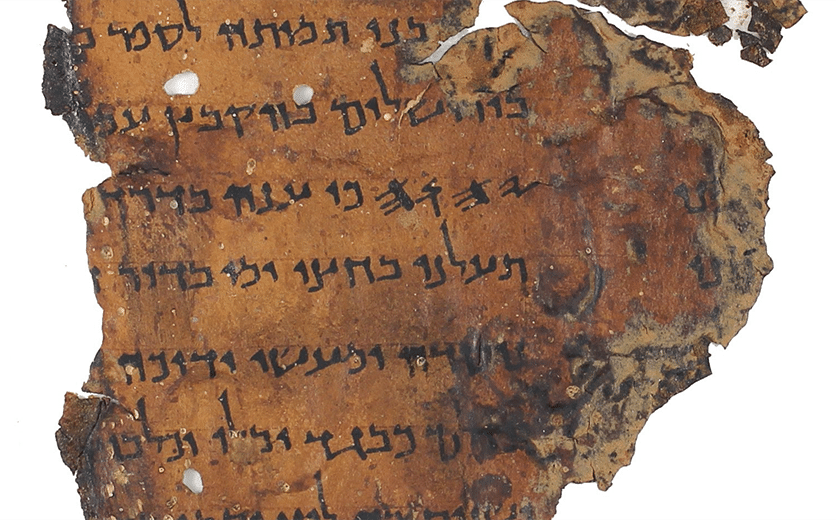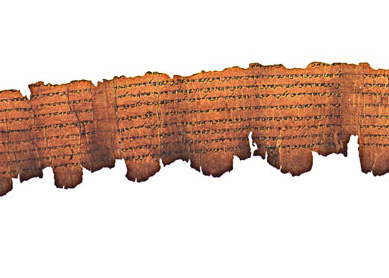English translations of the Hebrew Bible commonly refer to God as “Lord,” and the term is often written in all capital letters (Lord or LORD). These capital letters are not decorative. Rather, they signal that a special Hebrew term is being translated—YHWH, the personal name for God.
What does it mean when the biblical texts refer to God as “Lord”?
When an English translation of a biblical text calls God Lord, it signals the use the four-letter name of God. This name is represented in the Hebrew text by the consonant letters yod-heh-vav-heh. The original pronunciation of this name is lost to us because Jewish tradition does not pronounce this word in public reading; it is considered too holy. In fact, the only time this name was pronounced was by the high priest on the highest of the holy days, the Day of Atonement, in the inner sanctum of the temple, the Holy of Holies. Instead, when the name is read aloud from the Hebrew Bible, it is often replaced by the Hebrew words “hashem” (“the name”) or “Adonai” (“lord” or “master”).
The four-letter name of God in the Hebrew biblical texts was originally written only with consonants. When medieval Jewish scribes added vowels to the manuscripts of the Bible, they chose not to add the original vowels, again likely because of the sanctity of the name. Instead, they added the vowels that are found in the Hebrew word “Adonai.” Thus, English translations often use “Lord,” “Lord,” or “LORD” to represent the four-letter name of God. But, when you see Lord or one of its variants, remember, that behind the term stands those four Hebrew consonants, yod-heh-vav-heh.
“Jehovah” is another term commonly used for the four-letter name of God in early English translations. This form of the name combines the Hebrew consonants yod-heh-vav-heh and the vowels from the word “Adonai”: Y-a-H-o-W-a-H. In Latin, Y becomes J and W becomes V, which results in the form: J-e-H-o-V-a-H.
Many scholars think the four-letter name of God may have been pronounced in antiquity as “Yah-way,” with the accent on the first syllable. Therefore, in academic literature, one will often see the name referred to as Yahweh. Scholars also refer to the name by the four corresponding consonants in English, YHWH, or by the word “Tetragrammaton” (a Greek term that literally means “four letters”).
Where did the name come from, and what does it mean?
The four-letter name of God is considered the personal name of God. It occurs 6,823 times in the Hebrew Bible. A shortened form of this name is “Yah” (YH) which commonly appears in Hebrew poetry. Scholars vary in their opinion on whether this shorter form is the original form of the divine name. Some scholars have even suggested that both forms may have existed side by side.
The grammatical origin for this divine name is still open for debate. Suggestions range from the Arabic verb hwy, “to blow” (because YHWH was believed to originally be a storm-god) to an Egyptian origin that connects this name to the moon (because YHWH seems to be a modification of the original Egyptian name YAH-WEH, which meant “Moon-One”).
Many scholars, however, associate the origin of this divine name with the Hebrew verb hyh, “to be” or “to become.” Exodus 3:13–14, which presents itself as an etymology of the divine name, makes this connection explicitly. Although the name itself is even older than the events narrated, God reveals his name to Moses by the burning bush before the exodus event. Moses asks God by what name he should refer to the deity that has sent him to deliver the Israelites. God answers that Moses should tell the Israelites that “I am who I am” has sent him. By connecting the divine name to the verb “I am,” the text may be saying that God is the self-existent one. This form of the verb may also indicate a sense of continuation or the idea of a future continuing presence. In other words, the Hebrew verb tense may be expressing an eternal constancy. This is reaffirmed in Mal 3:6, where God reminds the prophet that “I am Yahweh; I do not change.”
Other scholars think that the connection to the verb “to be” or “to become” should be understood in an active sense, meaning that God is one who acts and brings things into being. This links God to creation in general or to the creation of Israel in particular as a people who have a special relationship with God. Therefore, this name is often associated with God’s covenant relationship with Israel. In Exod 34:6–7, for instance, the text declares God to be merciful, gracious, slow to anger, and abounding in steadfast love and faithfulness. God keeps this steadfast love to the thousandth generation, forgiving sins yet also holding the guilty accountable. This is an important characterization because it connects the personal divine name with God’s character as the covenantal God of Israel.
Whatever its origins, the name became an important part of the biblical tradition, identifying who God is and conveying what God means to the people.





